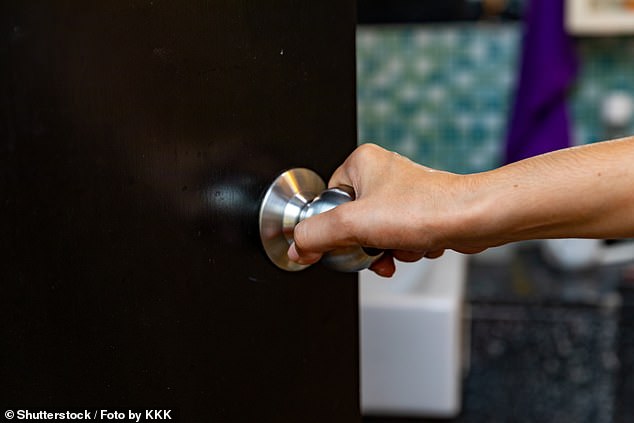Disgusting research shows how many people do NOT wash their hands after using the toilet
It’s something we all learn when we’re potty trained as children.
But a disgusting new study has revealed just how many people don’t wash their hands after using the toilet.
Researchers from the Australian Food Safety Information Council found that almost a fifth of people do not always wash their hands after going to the toilet.
In addition, almost half of respondents admit that they do not always wash their hands before handling food.
Worryingly, experts warn this could lead to the spread of bacteria, some of which can be fatal.
Write for The conversationDr. Christine Carson, a senior research fellow at the University of Western Australia, said: ‘You may not get sick yourself, but you are increasing the spread of bacteria.
‘This may increase the risk of infection and illness for other people, including people with compromised immune systems such as the elderly and people receiving common forms of treatment for cancer.’
It’s something we all learn when we’re potty trained as children. But a disgusting new study has revealed how many people don’t wash their hands after using the toilet (stock image)
The study involved 1,229 people aged 18 and over, who were questioned about their handwashing practices.
A total of 19 percent of respondents say they don’t always wash their hands after going to the toilet.
Lydia Buchtmann, CEO of the Food Safety Information Council, said: ‘This year’s Omnipoll consumer survey also found that 19% of Australians say they don’t always wash their hands after going to the toilet (up from 17% last year). years) and 42% admit they do not always wash before touching food (compared to 34% last year).
‘There was a slight improvement in handwashing during COVID-19, but now Australians appear to be falling back on old habits.’
The results revealed differences in handwashing practices across both gender and age.
Men are less likely than women to always wash their hands after going to the toilet (80 percent of men versus 83 percent of women), or before touching food (55 percent of men versus 62 percent of women).
Meanwhile, young people turned out to be significantly worse at washing their hands than older generations.
Only 69 percent of under-34s say they always wash their hands after going to the toilet, compared to 86 percent of those over 65.

When you use the toilet and touch surfaces in the bathroom, you pick up germs. People who skip the hand-washing step on the way out take these germs with them when they leave and then deposit them on every surface they touch (stock image)
“Urine and feces contain millions of germs, especially feces, which contains more than 100 billion germs per gram,” Dr. Carson said.
‘When you go to the toilet and touch surfaces in the bathroom, you pick up germs.
“People who skip washing their hands on the way out are taking those germs with them when they leave and then depositing them on every surface they touch.”
Although the Food Safety Information Council survey did not look at people’s reasons for not washing their hands, Dr Carson says these are likely to vary depending on people’s lives and circumstances.
“A study on this question in India asked schoolchildren about barriers to handwashing,” she explained.
‘The vast majority (91%) had a low ‘disease threat perception’.
‘In other words, they simply saw no risk of getting sick if they didn’t wash their hands after going to the toilet.
‘Interestingly, the inability to see germs with your own eyes was one of the biggest obstacles, cited by 46% of children.
‘But 72% said they would wash their hands if their friends did.
“It’s tempting to speculate that these reasons may also apply to other age groups, but we simply haven’t done enough research to know.”
Based on the findings, the Food Safety Information Council is urging people to improve their handwashing practices.
‘The Food Safety Council’s advice is to always wash and dry your hands before touching, preparing and eating food, after touching raw meat, fish, seafood, shell eggs or poultry, after using the toilet, looking after children (or others’) going to the toilet and changing diapers, after blowing your nose, after touching a pet or cleaning litter boxes, and after gardening,” Ms. Buchtmann added.
To wash your hands properly, the Food Safety Information Council says you should:
1. Wet your hands and rub them well together to create a good lather with soap for at least 20 seconds. Don’t forget to wash between your fingers and under your nails. You may need to use a nail brush.
2. Rinse well under running water to remove the insects from your hands.
3. Dry your hands thoroughly on a clean towel for at least 20 seconds. Touching surfaces with damp hands encourages the spread of insects from the surface to your hands.
4. If running water is not available, use an alcohol hand gel.
